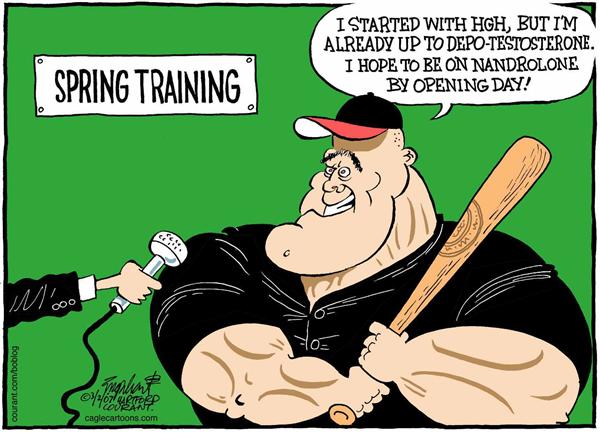Andropause: A Diagnosis Whose Time Has Come
Testosterone Replacement for Men Revisited

When one thinks of testosterone use by men, rippling muscles, a super libido, or aggressive personalities likely come to mind. These extreme impressions fail to highlight the many critical benefits of testosterone use, which most men are currently unaware of. Recently, a large number of men are becoming increasingly aware of andropause, an imperceptible decline of testosterone to deficiency levels, beginning around the age of 30 years and decreasing to deficiency levels by the age of 45 to 50 years.
Clinically deficient men usually have a blood level below 350 nanograms per deciliter (normal is 350-1,000 ng/dl) with optimal levels seen around 450 to 900 ng/dl. Associated symptoms usually consist of loss of energy, weight gain, decreased stamina, sleep disturbances, hot flashes, joint pain, decreased sex drive, depression, poor concentration and memory, frequent urination, and becoming socially withdrawn.
Around 45 years ago, the medical community brought to light the menopausal condition that women faced as they aged. They found that estrogen and progesterone replacement helped to resolve the negative symptoms associated with menopause. Because women were able to voice their needs, seek help, and embrace the suggested hormone replacement, many were able to overcome their debilitating symptoms of menopause. Because of our culture, men tend to be less inclined to verbalize their feelings and needs, compared to women. This lack of verbalization, and reticence in seeking out medical advice or information regarding the symptoms of andropause, accounts for why broader awareness of this condition is just now surfacing even though it has been known to exist for years. At the same time that men are now seeking the help and information about their hormonal health that was sought by women 40 to 50 years ago, andropause is also increasingly being recognized by the medical community. The benefits of testosterone replacement for men are well documented and supported by many excellent peer-reviewed medical studies.
Even more important than symptom relief are the long term benefits that can be seen from testosterone replacement. Testosterone deficiency is linked to a 260% increase in the risk of acquiring cardiovascular diseases. Testosterone replacement reduces those risks by dilating blood vessels and increasing blood flow and circulation throughout the body, thereby decreasing the risk of coronary artery disease and angina, reducing blood pressure, and increasing stamina. Decreases in fibrin production, involved in blood clots, which lead to strokes and heart attacks, are also seen. Testosterone replacement therapy decreases the production of foam cells, which is the source of plaque formation leading to atherosclerosis.
The muscle-building effects of testosterone help to decrease your body mass index (BMI). This translates into increased fat metabolism, which helps to decrease obesity around the waist. Increasing muscle mass also helps to increase insulin sensitivity, which decreases insulin resistance that could eventually lead to such conditions as Type 2 diabetes and metabolic syndrome X, a combination of diabetes and cardiovascular problems.
Testosterone stimulates increased bone formation, which decreases a condition called osteoporosis. It reduces the risk of Alzheimer’s disease by reducing the production and formation of the devastating beta amyloid plaques. Testosterone also helps to improve cognition and memory function with improved blood circulation in the brain, and also stimulates nerve growth factors which increases nerve-tissue growth. It decreases depression and improves mood as a result of increased serotonin production. There is decreased incidence of rheumatoid arthritis, and other inflammatory conditions, due to a decrease in the inflammatory chemical messengers that provoke these conditions. These are some of the exceptional benefits of testosterone replacement known today.
Another concern regarding the use of testosterone replacement has been its suspected association with prostate cancer. It was almost universally believed, until just a few years ago, that testosterone replacement therapy would lead to some degree of prostate cancer. This has been another reason why most men and, to a greater degree, the medical community, have shied away from testosterone use. These beliefs and conclusions were based on three studies. The first study was by Huggins and Hodges in the 1940 journal Cancer Research, involving only three patients. The second was the Memorial Sloan-Kettering Trial, and the third was the 1980 Lupron study regarding the Testosterone Flare. All of these studies had similar conclusions, namely, that testosterone caused enhanced growth of existing prostate cancer. These conclusions led the medical community to believe that testosterone therapy would cause new prostate cancers to arise or hidden ones to grow.
Though it’s based on erroneous interpretations, this association has been gospel for over 65 years. However, in 2011, Dr. Abraham Morgentaler, a Harvard professor, did a two-and-a-half-year study, documenting new evidence, generating the “saturation model” that explained the paradox of existing prostate cancer growth and suppression. In this saturation model, Morgentaler uses the analogy of a house plant that has dried out due to getting no water for a week. When the plant was revived with water, it began to appear healthy once again, growing and flourishing. Once saturated, however, further water would not produce any healthier appearance or growth. This analogy appropriately describes the “testosterone saturation” effect on prostate cancer growth: Once the prostate has been saturated with testosterone no further growth of the prostate would occur. Testosterone levels generally above 120 ng/dl suppressed growth, and provided protection against any prostate cancer growth.
To summarize, the facts are that low blood levels of testosterone do not protect against prostate cancer, and, in fact, may increase the risk. High testosterone blood levels do not increase the risk of prostate cancer and are protective.



